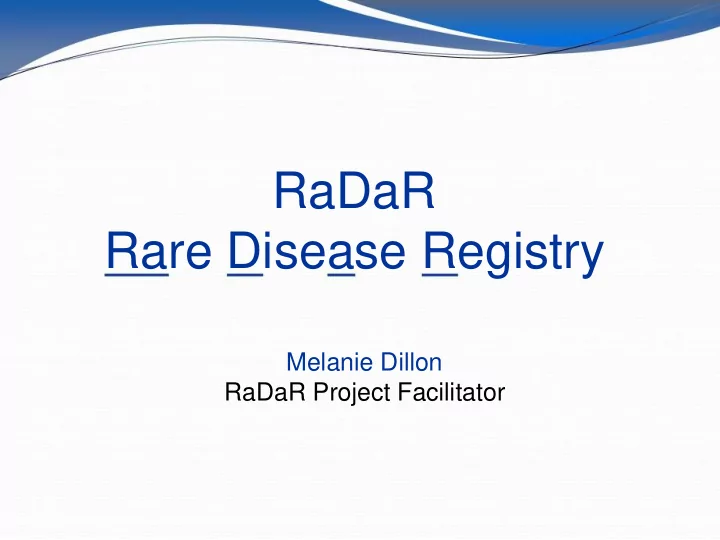

RaDaR Rare Disease Registry Melanie Dillon RaDaR Project Facilitator
Background The National Registry of Rare Kidney Diseases (RaDaR) is a Renal Association initiative designed to pull together information from patients who have certain rare kidney diseases. This will give a much better understanding of how these illnesses affect people. It will also speed up research. RaDaR is managed by a series of Rare Disease Groups consisting of experts in each condition.
History RaDaR began in 2009, recruiting paediatric patients with Steroid Resistant Nephrotic Syndrome(SRNS) and Membranoproliferative Glomerulonephritis (MPGN) In 2012 it expanded to other conditions in paediatric centres and then to adult centres in Autumn 2013. RaDaR now has UK-wide ethics approval for both adult and paediatric recruits for 25 conditions.
Current Status of RaDaR There are currently: 2,048 UK patients in RaDaR including: 417 with Nephrotic Syndrome 98 adults 319 children
Link with Patient View RaDaR draws information from Patient View, an online system which records renal patient’s results, medications and clinic letters. Recruited patients are given access to Patient View to see their data online. The majority of renal units in the UK use Patient View. Those that don’t can still take part in RaDaR but have to enter the patient’s data manually.
Data Collection RaDaR collects two types of data Demographic - name, address, date of birth etc. This is to help your hospital identify your records. It does not get passed to the research team. Medical - height, weight, blood pressure, blood and urine results, medications, etc. Updated every six months and visible to the research team as an anonymous record.
NephroS The National Study of Nephro tic S yndrome (previously called the SRNS study) is open to all patients with Nephrotic Syndrome - Steroid Resistant and Steroid Sensitive. Over 300 paediatric patients have been recruited to date, from 18 renal units in the UK. The study is now open in adult renal units as well.
NephroS Uses data collected as part of RaDaR Collects blood samples at: Time of consent At relapse and remission Before and after kidney transplantation (if applicable) Plasma exchange bags are also collected if Nephrotic Syndrome returns after transplantation
NephroS Samples are sent to the Bristol research group for DNA sequencing and lab analysis. DNA results are reported back to your consultant to discuss with you. Lab data is used alongside RaDaR data to: Identify causes of Nephrotic Syndrome Identify common disease patterns. The ultimate aim is to develop: Predictive tests to determine disease course New drugs to treat Nephrotic Syndrome
Information Security Data is encrypted and password protected. Participants provided with a secure log-in to access and check their own information via Patient View. Identifiable data only available to patient’s clinician and unit administrator. Members of the Rare Disease Groups will only see anonymised data - numbers rather than names.
To take part… If your child is treated at BCH: Collect an information sheet Sign the RaDaR consent form Hand back to me NephroS consent will be taken at your next clinic visit If you or your child are currently treated elsewhere: Collect an information sheet Take to your doctor at your next appointment Ask them to register you
RareRenal.org Patient information on rare kidney diseases, including Steroid Sensitive and Steroid Resistant Nephrotic Syndromes Contains links to support groups and reports of patient information days Written by experts in each condition and managed by the Renal Association
Contact Details Nephrotic Syndrome Rare Disease Group NephroS@rarerenal.org Melanie Dillon - RaDaR Project Facilitator Melanie.Dillon@renalregistry.nhs.uk
Recommend
More recommend